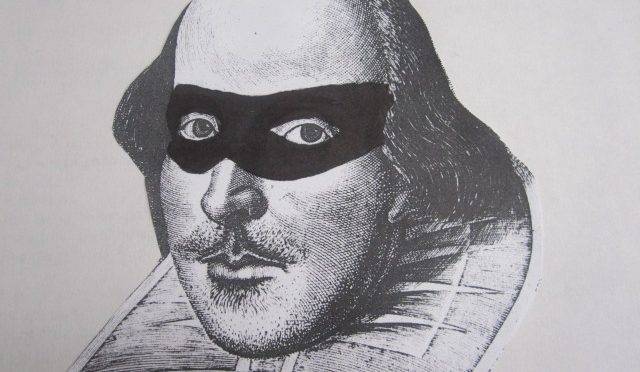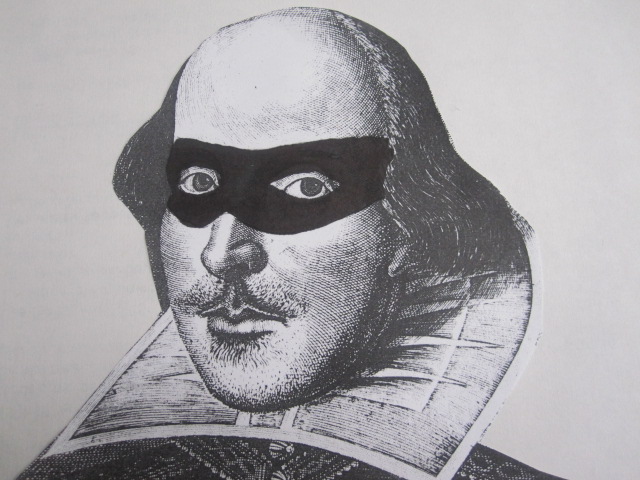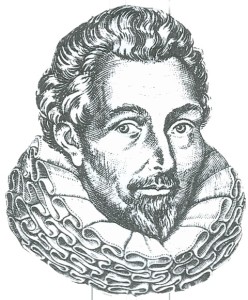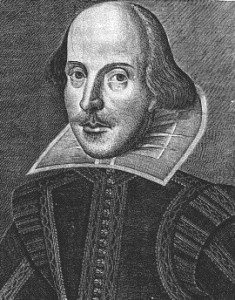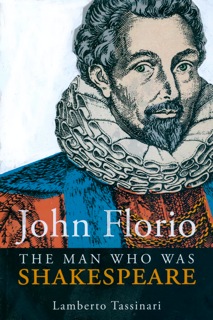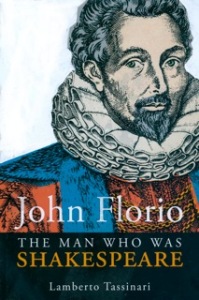Lamberto Tassinari
Ce titre vous donne des frissons ? À moi aussi…, mais laissez-moi vous expliquer.
La route qui lie don Quichotte à Hamlet part de Londres, c’est-à-dire de Shakespeare, de son identité incertaine. La Shakespeare Authorship Question, ainsi qu’a été définie la question de la paternité des œuvres de Shakespeare, n’est pas le résultat d’une paranoïa qui dure depuis quatre siècles, mais une affaire très sérieuse à laquelle se sont intéressés des esprits parmi les plus brillants des nos temps modernes : Walt Whitman, Charles Dickens, Mark Twain, Henry James, Sigmund Freud, parmi d’autres.
En 2007, deux acteurs shakespeariens réputés, sir Dereck Jacobi et Mark Rylance, ont parrainé une initiative internationale, la Declaration of Reasonable Doubt About the Identity of William Shakespeare, dont le but est justement de faire le jour sur l’énigme littéraire la plus importante de l’histoire. Il est donc légitime et raisonnable de douter !
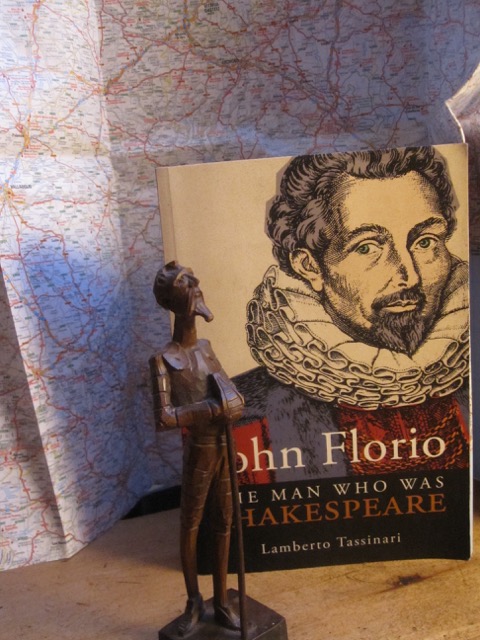
Shakespeare n’a jamais existé. Toutes ses pièces ont été écrites par un inconnu qui portait le même nom que lui. Alphonse Allais, 1854-1905.
Londres
Même la critique shakespearienne officielle admet que la personne de Shakespeare manque de consistance, que l’homme n’est pas là . La personnalité de l’auteur a explosé en s’éparpillant dans les personnages de son théâtre et de sa poésie à un niveau et d’une façon qui n’ont pas d’égal chez d’autres écrivains modernes de la même stature. Autre fait frappant : aucun contemporain parmi les écrivains et les correspondants étrangers à Londres n’a jamais eu le grand dramaturge comme ami, compagnon ou adversaire. De tous les documents qu’on possède datant de son vivant, aucun n’est vraiment personnel, et aucun ne présente comme un écrivain l’homme de Stratford. Shakespeare, à son époque, apparaît comme une réputation littéraire, comme un nom, un auteur abstrait plutôt qu’un protagoniste réel de la vie mondaine et culturelle. Nous ne possédons aucun manuscrit du Barde, à peine six signatures tremblotantes, pas une seule lettre reçue ou envoyée. Il n’a jamais dédicacé une pièce de théâtre à ses prétendus mécènes et personne ne lui a jamais dédicacé quoi que ce soit. Le génie autodidacte de Stratford, ni noble ni instruit, aurait écrit des œuvres pleines d’érudition pour les rois et pour les privilégiés, mais ses deux filles signaient d’une croix… Si on examine Shakespeare, son histoire, on y perçoit deux courants distincts et irréconciliables. D’un côté, la vie assez bien documentée mais insignifiante d’un acteur médiocre et imprésario de théâtre qui a été baptisé, qui n’a, probablement, fréquenté que quelques années l’école, sûrement pas l’université, qui s’est marié, a eu des enfants, a acheté des propriétés, n’a jamais voyagé, a été usurier, a connu des ennuis judiciaires, n’a pas possédé un seul livre, pas même une bible. Ce même personnage a dicté à un avocat un testament d’une banalité déconcertante (voir http://www.johnflorio-is-shakespeare.com/will.html) mais si parfaitement en accord avec la vie qu’il a vécue. De l’autre côté, il y a une œuvre théâtrale et poétique parmi les plus grandes sinon la plus grande de tous les temps, d’une complexité, d’une richesse culturelle et linguistique infiniment supérieures aux œuvres des auteurs contemporains britanniques.
Si l’homme de Stratford possède une identité embarrassante, il faut dire que ce vide a représenté une occasion idéale pour l’imaginaire critique : tout est dans le texte, la vie ne compte plus, ont conclu les critiques littéraires.
Mais rapprochons-nous de l’embouchure du tunnel.
Dans ma recherche sur Shakespeare, le véritable tournant a été la découverte de l’existence de Giovanni Florio, né à Londres en 1553. Il y a notamment, dans La Tempête, un passage utopique, un exploit philosophique prononcé par Gonzalo (2,1,143-152) que la critique a reconnu depuis toujours être le calque du Discours sur les Sauvages de Montaigne. Or le traducteur anglais du texte de Montaigne que Shakespeare a copié est, justement, John Florio. À partir de cette trace, ma recherche s’est concentrée sur le traducteur oublié. J’ai assez rapidement compris que Florio, loin d’être un acteur secondaire, était un protagoniste essentiel de la vie culturelle et littéraire de l’époque. Je me suis alors demandé pourquoi ce linguiste, lexicographe, traducteur, courtisan, ami des plus puissants parmi les nobles de son époque, durant seize ans secrétaire personnel de la reine Anne du Danemark et grand diffuseur des cultures européennes en Angleterre a été boudé par tous les universitaires de la planète. Pourquoi a-t-il été classé par toute la critique comme un technicien, un « col bleu », à côté des vrais artistes ? Pourquoi les seules et rares études qui présentent Florio comme un intellectuel majeur et un écrivain de grand talent datent-elles toutes d’une courte période entre les années 1920 et 1930 ? Pourquoi, depuis, ces quatre-vingts ans de silence ? Enfin, pourquoi un acteur si important pour la connaissance de la Renaissance anglaise et en particulier pour l’œuvre de Shakespeare a-t-il été ignoré ?
Au moment où j’ai lu les deux biographies de Florio, la première publiée en français en 1921 par Clara Longworth de Chambrun, Giovanni Florio. Un apôtre de la Renaissance en Angleterre à l’époque de Shakespeare, et la deuxième en anglais, John Florio, The Life of an Italian in Shakespeare’s England de Frances Amelia Yates, j’ai décidé de me consacrer à ma recherche avec une énergie nouvelle. Sept ans plus tard, en février 2008, mon livre a paru en italien. En 2009, j’ai publié la traduction anglaise intitulée John Florio, The Man Who Was Shakespeare. Avec ce livre, j’ai pu conclure que John Florio a écrit des œuvres de poésie et des pièces de théâtre, soit en les laissant anonymes, soit en les signant sous le pseudonyme de William Shakespeare, soit parfois avec le seul nom de plume Shake-speare, écrit ainsi, avec un trait d’union.
Les écrits du linguiste Florio ont évidemment beaucoup d’éléments en commun avec les pièces de théâtre signées Shakespeare ! L’analyse comparée de toute cette matière permet de conclure philologiquement qu’il s’agit en réalité d’un seul et unique auteur, John Florio, qui utilise son patronyme pour les œuvres d’érudition, et un nom de plume, Shakespeare, pour ses œuvres de fiction (shake spear, où la « lance » est évidemment sa plume). Des centaines et des centaines de mots, phrases, proverbes, idées utilisés par Shakespeare se retrouvent, très souvent antérieurement, dans les œuvres de Florio. Les deux hommes, Florio et Shakespeare, sont les plus importants créateurs de néologismes de leur époque. Le linguiste en a créé 1149, le dramaturge 1969.
Les deux hommes ont le même style, utilisent les mêmes tournures de phrase, ils créent leurs mots à partir de l’italien, du français et du latin en suivant la même méthode. Mais il y a une différence cruciale encore une fois : Florio a étudié, il possède une éducation universitaire (il a fréquenté l’université de Tübingen en Allemagne et l’université d’Oxford), il possède une érudition certaine, il a résidé et voyagé en Europe et, dans son testament, a laissé à son ex-élève et protecteur William Herbert, troisième comte de Pembroke, une bibliothèque de plus de 700 volumes en quatre langues, l’une des plus riches de l’époque ! (Soit dit en passant : tous ces livres ont depuis disparu…) L’acteur de Stratford, de son côté, a peut-être fréquenté six ans l’école élémentaire, n’a jamais quitté son île et n’a pas laissé d’indice d’avoir possédé un seul livre…
Madrid
C’est le moment de pénétrer dans le tunnel.
Après avoir montré dans mon livre les raisons de la coïncidence de Shakespeare avec John Florio, en poursuivant mes recherches sur le même terrain, j’ai fait une découverte étonnante. Durant la courte renaissance anglaise, un rôle extraordinaire a été joué par la traduction : tout devait être traduit (les classiques et les modernes, les Italiens, les Français, les Espagnols) dans cette île qui, à l’époque, était plutôt « barbare » comparée à l’Italie, à la France et à l’Espagne. Avec une langue que personne ne parlait sur le Continent, elle était la Cendrillon de l’Europe. Or je l’ai dit, John Florio, alias Shakespeare, a été un des plus grands traducteurs de son temps mais, parmi ceux qui ont accompli un ouvrage remarquable, j’ai découvert aussi le traducteur du Don Quichotte, un certain Thomas Shelton. Je me suis dit que l’Irlandais Shelton aurait pu connaître Florio, Italien de lointaine origine juive espagnole et qui était dans une position de premier plan à Londres. Mais non, de Thomas Shelton il n’y a presque pas de traces dans l’Histoire. Il a traduit un chef-d’œuvre comme le Quichotte et rien d’autre : mille pages de grande littérature qui ont été lues par tous les écrivains anglais jusqu’aux XIXe et XXe siècles, mais rien sur le traducteur. Et pourtant, Cervantès et Shakespeare étaient tous les deux encore vivants en 1612… Le cas est trop vaste et complexe pour le présenter ici de façon exhaustive. J’ai écrit un long texte destiné à devenir bientôt un livre. J’ai réalisé que les rapports entre Shakespeare et Cervantès ont été perçus depuis très longtemps : il existe d’étranges consonances, d’incroyables similitudes et des coïncidences entre les œuvres des deux écrivains. Plusieurs exégètes se sont penchés sur la proximité entre la poétique de Cervantès et celle de Shakespeare, sur la parenté existant entre la philosophie de don Quichotte et celle d’Hamlet, entre l’esprit de Sancho et celui de Falstaff, etc., malgré la délicatesse du sujet qui touche à la susceptibilité de deux nations ex-impériales. Cela a retardé, voire carrément empêché une confrontation approfondie – historique, linguistique, sémiotique – entre ces deux cultures géographiquement distantes et entre ces deux langues. La simple possibilité que leur Génie national puisse dépendre de quelque façon que ce soit de l’autre grand rival étranger a suffi à décourager les spécialistes des deux côtés. Cependant, malgré ce tabou, comme toujours, il y a eu des gens qui ont vu et qui ont écrit. Ainsi a pris forme la question du rapport entre Shakespeare et Cervantès. Aujourd’hui, l’histoire du Cardenio, l’œuvre théâtrale perdue que Shakespeare aurait écrite avec John Fletcher et dont la matière provient du Don Quichotte, se trouve au centre de l’attention dans les deux camps. Mais déjà en 1860 l’écrivain russe Ivan Tourgueniev, dans une célèbre conférence parisienne, avait élaboré sur la très forte affinité entre Shakespeare et le Don Quichotte. José Ortega Y Gasset de son côté avait approfondi le lien en 1914. En 1916, James Fitzmaurice-Kelly dans une conférence intitulée « Cervantes and Shakespeare » soutenait :
« … il n’y a aucun doute que Cervantès était à portée de main de Shakespeare. La traduction par Thomas Shelton de la première partie du Don Quichotte a bien été publiée en 1612. Est-ce que Shakespeare l’a lue ? Il me semble absolument probable que oui. »
L’intérêt est toujours si vif que, en 2005, l’Université d’Alicante a décidé d’organiser un séminaire portant sur le rapport entre les deux grands écrivains avec le titre « Cervantes and Shakespeare : New interpretations and comparative approaches » dont les actes ont été publiés l’année suivante. Dans l’introduction, J.M. Gonzalez Fernandez de Sevilla écrit, entre autres : « Bien qu’ils [Cervantès et Shakespeare] aient été considérés comme les plus grands modèles de la littérature occidentale, les spécialistes ont prêté peu d’attention à l’étude et à l’analyse de certains aspects similaires et contrastants qui pourraient par contre nous les faire comprendre davantage » (je souligne).
Un livre sur le sujet est paru en septembre 2012, The Quest for Cardenio. Shakespeare, Fletcher, Cervantes, and the Lost Play aux Presses de l’Université d’Oxford. Ce premier recueil d’essais témoigne de l’importance du rapport entre Shakespeare et Cervantès pour la recherche universitaire. Ce qu’il m’intéresse de souligner est que le rapport très étroit entre Shakespeare et Cervantès n’est pas le fruit de l’esprit troublé d’un investigateur isolé, mais bien un argument défini et étudié dans les universités. En étudiant et en comparant les quatre écrivains – Shakespeare, Cervantès, Florio et Shelton –, je me suis aperçu qu’il y avait beaucoup de chevauchements !
Voici une courte liste des similitudes entre Shakespeare et Cervantès qu’on a constatées au fil des siècles, mais que la critique a généralement négligé d’interpréter :
- Sans éducation formelle, les deux réussissent à écrire des œuvres très riches en culture, en savoir : Cervantès ingenio lego (esprit inculte) comme Shakespeare, génie autodidacte.
- L’ampleur de leurs lectures : le Don Quichotte, défini comme « un libro que habla sobre libros » ; les pièces de Shakespeare qui renvoient à des centaines de livres appartenant, à tout le moins, à cinq littératures : l’italienne, la française, la latine, l’espagnole, l’anglaise.
- La bibliothèque de don Quichotte et les livres de Prospero, c’est-à-dire la bibliothèque fantôme de Shakespeare.
- La culture encyclopédique de Shakespeare et de Cervantès.
- La tendance commune aux emprunts, presque au plagiat. Les deux pillent au gré de leurs besoins.
- L’influence italienne, des emprunts substantiels aux œuvres de Boccaccio, Sannazaro, Aretino, Tasso, Ariosto, la commedia dell’arte, Machiavelli, Cinzio, Castiglione, Bandello, etc.
- La surprenante familiarité avec la Bible, évidente dans les œuvres de Shakespeare, est identique à la tout aussi surprenante culture biblique de Cervantès.
- La grande, comparable connaissance des systèmes juridiques et légaux de leurs pays.
- La musique : les deux ont une sensibilité et une culture musicales semblables.
- Le fait que, comme dans le cas de Shakespeare, il n’existe pas de portrait certifié de Cervantès.
- Les manuscrits : autant pour Shakespeare que pour Cervantès, leur absence est totale.
- Coïncidence finale : les dernières pièces du Barde et les Novelas ejemplares de Cervantès sont des romances.
Outre ces points de contact concernant la biographie et la formation littéraire, il y a de nombreuses analogies structurelles, profondes entre les deux œuvres. Le Don Quichotte, le seul livre génial de Cervantès d’après Jorge Luis Borges, apparaît à Madrid l’année même où Angleterre et Espagne signent un traité de paix en 1605 à Valladolid. Mais le roman, promu par la Cour et jouissant d’un bon succès « de public », sera toutefois reçu avec hostilité par les écrivains espagnols. Considéré come un livre un-Spanish, il ne sera vraiment accueilli que deux siècles plus tard par la culture espagnole désireuse alors de rentrer dans la modernité. Sa fortune et son épanouissement en Angleterre, par contre, ne feront que grandir avec le temps.
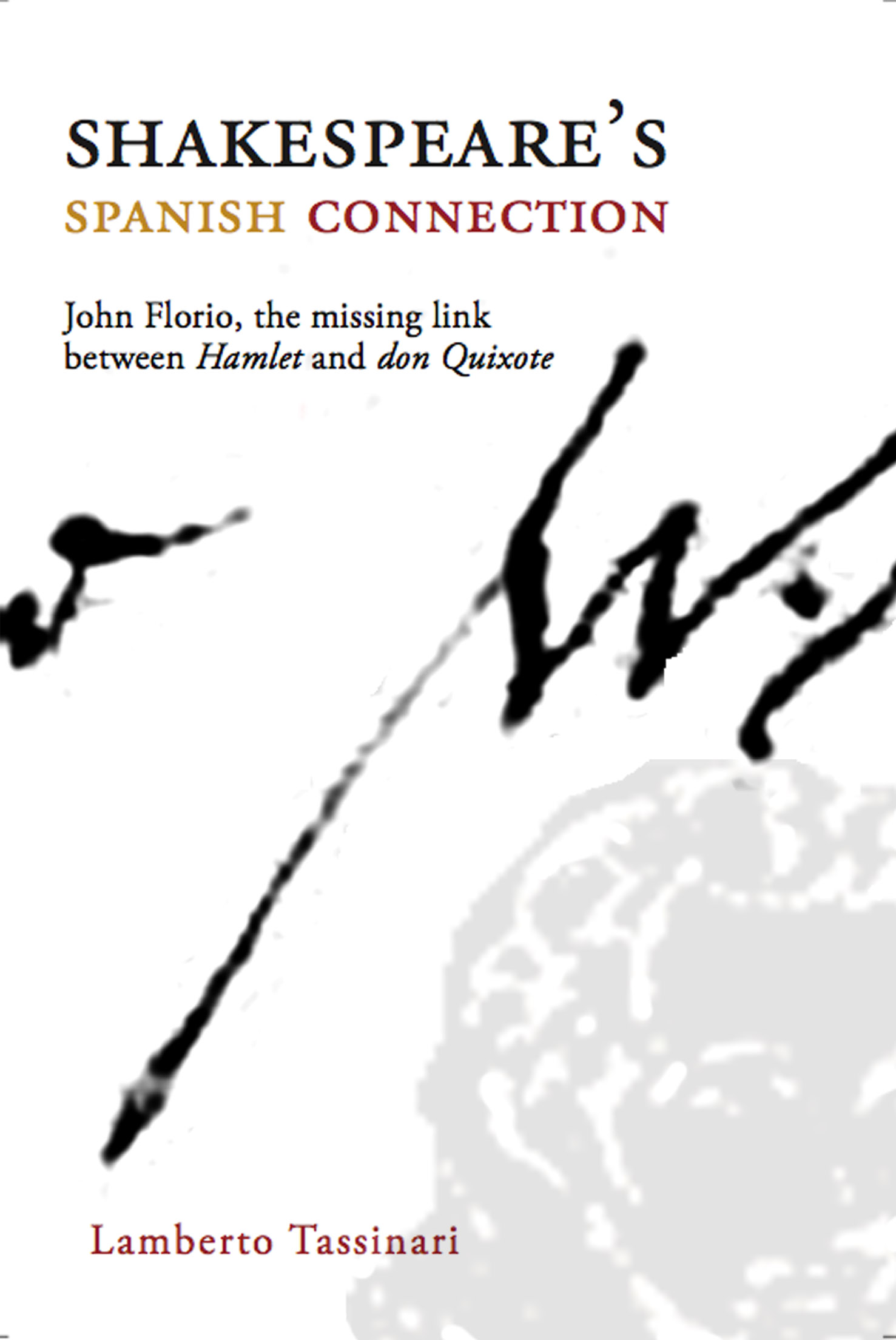
Finalement, le tunnel Londres-Madrid nous mène vers plein de surprises : l’Anglais, le plus grand dramaturge moderne, et l’Espagnol, le premier romancier moderne, ne sont pas liés que par des traits esthétiques et stylistiques formels, mais par un lien bien plus profond et, je dirais, fort « charnel ». L’étude de cet improbable « quatuor » littéraire est la clé qui permet la transformation radicale de notre conception du début de la modernité et de notre interprétation de la fabrication des littératures nationales.

